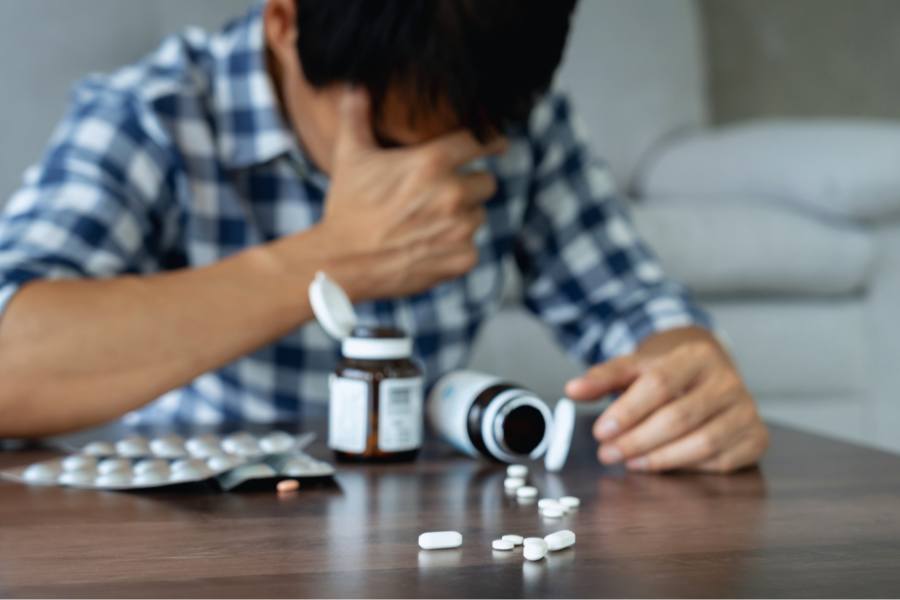When Substance Use or Abuse Becomes a Form of Self Soothing
The Progression of Self Medicating with Drugs and Alcohol
Using substances in and of itself isn’t a reason to worry. Most adults use alcohol: that’s a substance. It’s substance abuse that’s the problem. This is exactly why it is so important to find out how to tell the difference between use and abuse.
Many people use substances like alcohol, prescription drugs, recreational drugs, food and nicotine to self medicate for mental health symptoms, but it can certainly become problematic when self-soothing becomes self-medication, and leads to abuse and addiction.
This is why the latest of our SOBRLIFE resources focuses on when substance use or abuse becomes a form of self soothing shows the progression of using drugs into addiction, and offers insights into how and when to seek a sober lifestyle!
Increased Consumption and Tolerance = Substance Abuse
It’s not always easy to tell the difference between substance use and substance abuse. One way to tell is by consumption rate. Increased consumption, especially rapid consumption, is a red flag for abuse and dependence.
This is because the body and brain can start to build up a tolerance to certain substances. The central nervous system adapts to increased substance use and tolerance and dependence develops. A dose that once gave you euphoria and a high might not feel enough.
When this happens users may start to take more and more of a substance. Increased tolerance and increased consumption means physical dependence has already set in.
Spotting increased consumption is easy to do. Whether you’re abusing a substance yourself or trying to help a loved one, more of anything is a problem. It doesn’t have to be a larger dose. It could be more frequent dosing. You may not see a loved one drinking heavily but they might be starting earlier and earlier in the day and no one would know.
Substance Abuse is Self Medication Despite Ongoing Consequences

One way to tell substance abuse is when use continues despite negative consequences. For example, a man uses cocaine. Without any consequences, he might not even realize that cocaine use is affecting his life. If those consequences become clear and he continues to use cocaine then there’s a bigger disorder at play.
The consequences of substance abuse are impossible to list because the list would be too long. Financial consequences are common since many substances can become expensive. If someone is bankrupt or missing bill payments and still finding money to spend on substances like drugs or alcohol then substance abuse and dependence is a given. Substance abuse can also worsen mental health issues making it even harder to break the cycle of addiction.
Health, career, and relationships are still more types of consequences that can come from substance abuse disorders. When someone chooses substance abuse over meaningful relationships or they’re late to work regularly then they’re choosing substances over what really matters in life. That’s a clear sign of a problem. Seeking professional help is key to addressing substance abuse and its consequences.
Substance Abuse Comes Along With Behavioral Changes
Substance use doesn’t have to change behavior. If substance use isn’t a problem then it shouldn’t change daily routine or personality. Substance abuse however can change behavior in many ways. It can become a coping mechanism for stress and lead to significant behavioral changes.
Substance abuse often leads to increased anger or irritability. This can happen at any time but often happens after the effects of the substance have worn off. This is called the hangover or comedown and can make people behave in weird and unpleasant ways. People may use substances to manage stress which can worsen these behavioral changes.
Substance abuse can also lead to mental health disorders or worsen existing ones. Depression, anxiety, and even paranoia are common companions to the development of a substance abuse disorder.
In the end, any change in behavior is a sign of substance abuse. People may change their hygiene and grooming habits, and take less pride in their appearance. They may adjust their sleep patterns or spend more time alone than they used to.
Overall Health is Impacted by Substance Abuse
Substance use can cause health problems. But substance abuse is far worse for physical, emotional and mental health. Often people know that heavy or chronic use of certain substances causes health problems. Continuing to use despite that knowledge means abuse has taken over. High stress levels can lead to substance abuse as people may turn to drugs or alcohol to manage stress.
Many health problems can come from substance abuse. Substance abuse can affect sleep patterns, lead to mental health disorders, affect weight and nutrition, or put users in life threatening situations. Substance abuse can contribute to negative thoughts and mental health issues and worsen the cycle of addiction.
Substance abuse can also weaken the immune system and add stress to the body. That means users will get sick more often and get sick from the substance abuse itself.
When Illegal Drug Use Becomes Abuse

The World Health Organization defines substance abuse as any use of psychoactive substances that is dangerous or harmful. For some drugs, there is no safe or non-harmful way of using them. That means for some drugs any illegal use is drug abuse. That’s regardless of frequency or even dosage.
For example, taking heroin in any amount and at any time would be substance abuse. Taking heroin once is risky for health and the chances of addiction are huge.
Injecting any drug is also a health risk and anytime someone does it there’s a bigger problem at play. Taking unmarked drugs or anything homemade is never a good idea. Potency and ingredients can vary so wildly that safety is not an option. That’s compared to drinking a glass of wine which is use not abuse.
Joining a support group is important for those who are using illegal drugs as it provides support for recovery.
Confronting and Managing Substance Abuse
Recognizing substance abuse is a good first step but confronting and managing the abuse is not easy. Many people struggling with substance abuse are already addicted. When that happens there is no safe way of consuming anymore. Moderation is out and abstinence is the only option. Learning healthy coping mechanisms to manage substance abuse is key in this process.
Many will also benefit from a treatment plan to overcome substance abuse and addiction. While it’s possible to recover on your own it will always be easier with support, resources and 24/7 medical attention. Treatment plans often includes strategies to help you manage addiction effectively.
Joining the SOBRLIFE Community: Recovery for All
Just remember substance abuse doesn’t have to be a lifelong condition. There’s a thin line sometimes unrecognizable between substance use and substance abuse. Knowing the difference is the key to treating substance abuse disorders and living drug-free. You can stop the abuse once and for all and move on to a life of health and happiness.
At SOBRLIFE, we support and embrace the potential and possibility of recovery for all!
